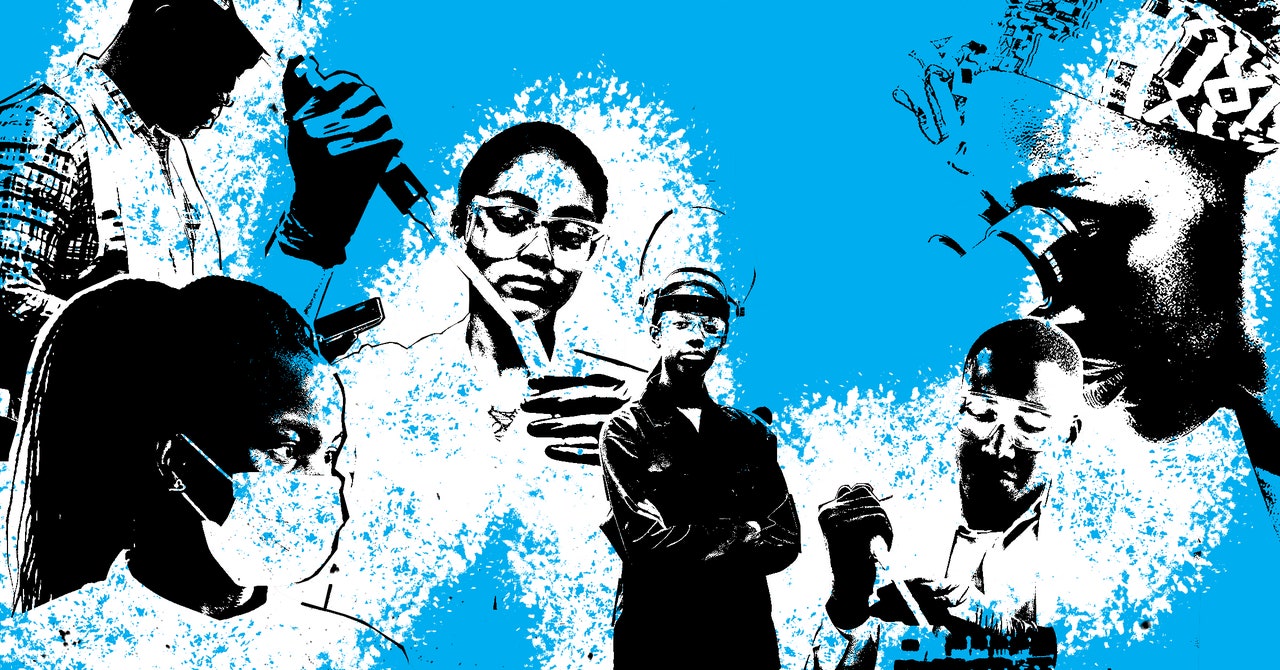
Blackstreet’s “No Diggity” kicks off the virtual mixer as people excitedly connect in the Zoom chat. “Love the vibe right now,” says Brionna Davis-Reyes in appreciation of both the DJ and the sign language interpreter, who is also doubling as a background dancer. Davis-Reyes introduces herself as a Yale neuroscientist studying addiction and impulsivity. She’s quickly followed by Tyrone Grandison, a technology executive and co-organizer of the event: “Is the DJ taking requests?”
Alissa Armstrong posts in the chat that she is a biologist who uses fruit flies to study how fat tissue communicates with other organs in the body. Hostess Dani K says yes, attendees can request songs, then gives Armstrong a punny shout-out. “It’s pretty fly what you’re doing, Dr. Alissa!”
It’s the end of the opening day for a conference hosted by Black in X, a network of over 80 organizations dedicated to celebrating the work of Black people in science, technology, engineering, and mathematics, or STEM, and a few dozen of the attendees have gathered to network during the day’s final session. For the rest of this week, Black scientists will meet online to discuss their successes and strategize for the road ahead. The conference is the culmination of a year-long push to confront systemic racism in the sciences, catalyzed by the racial profiling of Christian Cooper and the killings of Ahmaud Arbery, Breonna Taylor, and George Floyd. Since then, the Black in X groups have built a community across virtual spaces and advocated for increased representation and recognition by amplifying the voices of Black scholars.
Speaking before the conference, co-organizer Carlotta Berry, an electrical engineer at the Rose-Hulman Institute of Technology, said she wanted to create a place where attendees could appreciate all that had been accomplished since last June. “I’m hoping that the conference is a time to really sit down and reflect on what we’ve done—how powerful it is, how important that work is,” she said. After “a year of social justice and trying to impact the world,” Berry emphasized the value of finding time to rest “so that we can stand up and do it again,” she said. “Or do more, or go further.”
The conference theme is “Lift As We Climb,” a summation of the way in which Black in X organization members support each other’s work and experiences. “There are people who have lifted me, and I know that it is my responsibility, in turn, to lift others,” said conference organizer Quincy Brown last week. (Brown cofounded Black in Robotics and Black in Computing.) Earlier versions of communities like these helped her learn to navigate the unwritten rules and expectations of being a Black person in computing.
On Monday, the conference opened with a welcome speech from Samantha Mensah, a chemistry PhD student at UCLA, and Paige Greenwood, a newly-minted neuroscience PhD from the University of Cincinnati. As co-organizers, they reminded attendees of the unity that had been fostered over the past year during a nationwide racial reckoning. The welcome session was followed by a panel moderated by Grandison on software projects developed to combat racial inequities in housing, voting, legislation, and policing.
The rest of the week will include a virtual #BlackInXPoster session in which conference attendees will share their research on Twitter, plus forums on navigating academic and industry careers in STEM, and a conversation on being Black and disabled. On Friday afternoon, the sessions wrap up with a keynote speech by Kizzmekia Corbett, an immunologist newly appointed to Harvard University who was a leading figure in the development of the Moderna Covid-19 vaccine. The conference ends Saturday with a daylong advocacy event for STEM education.


